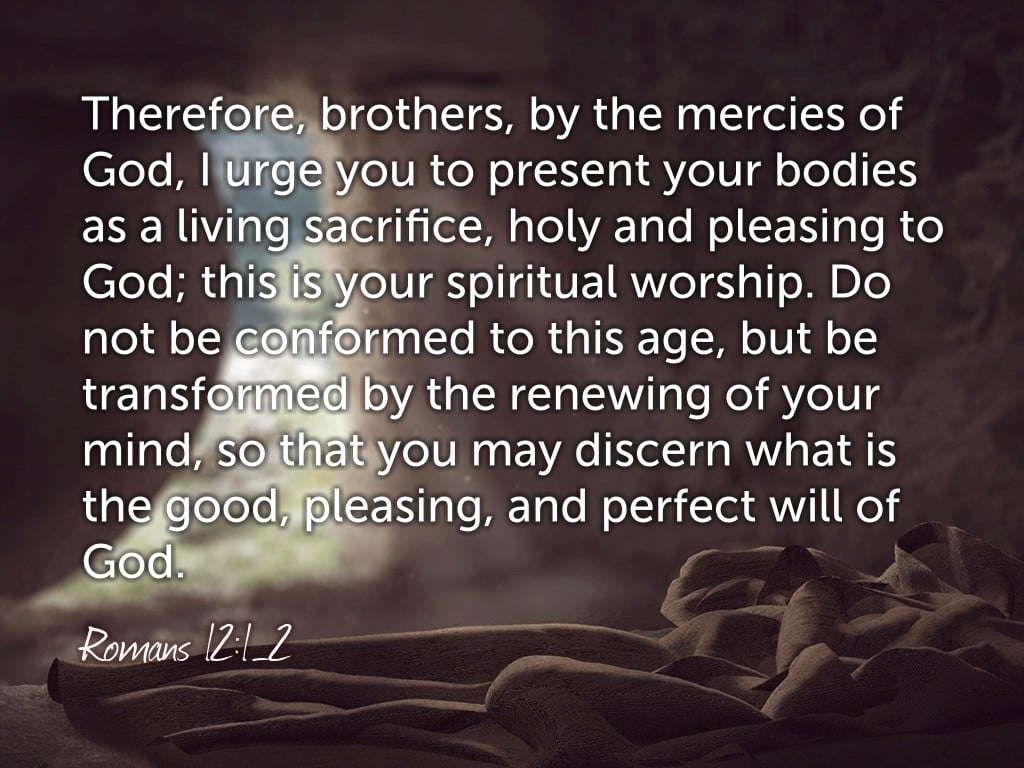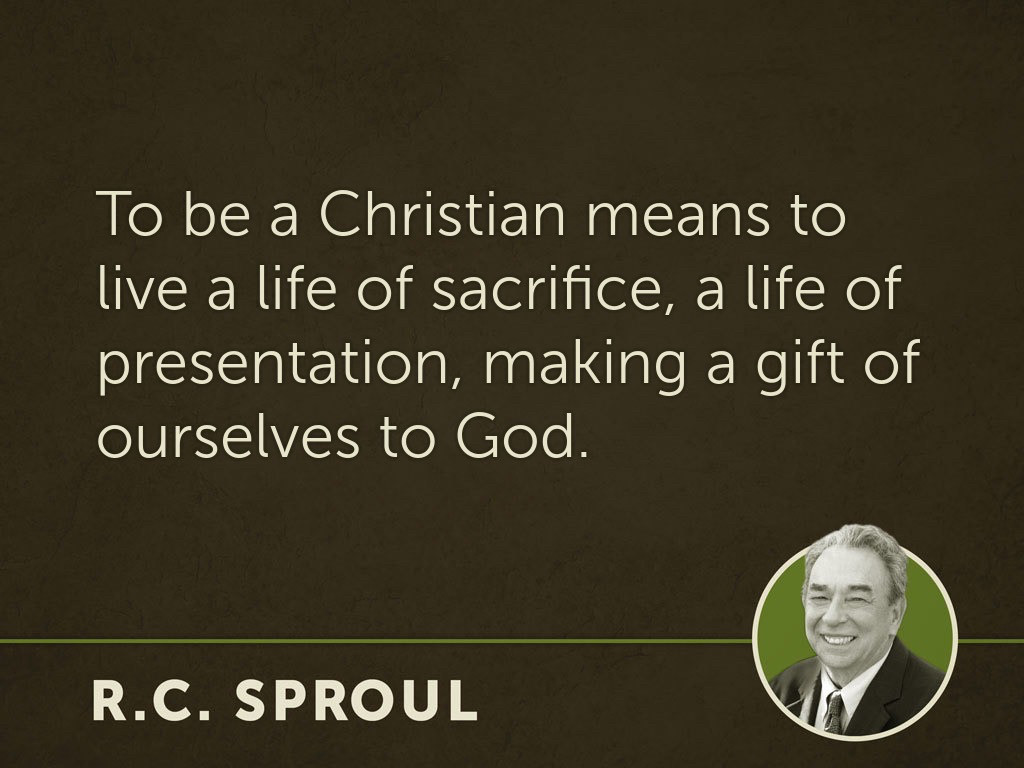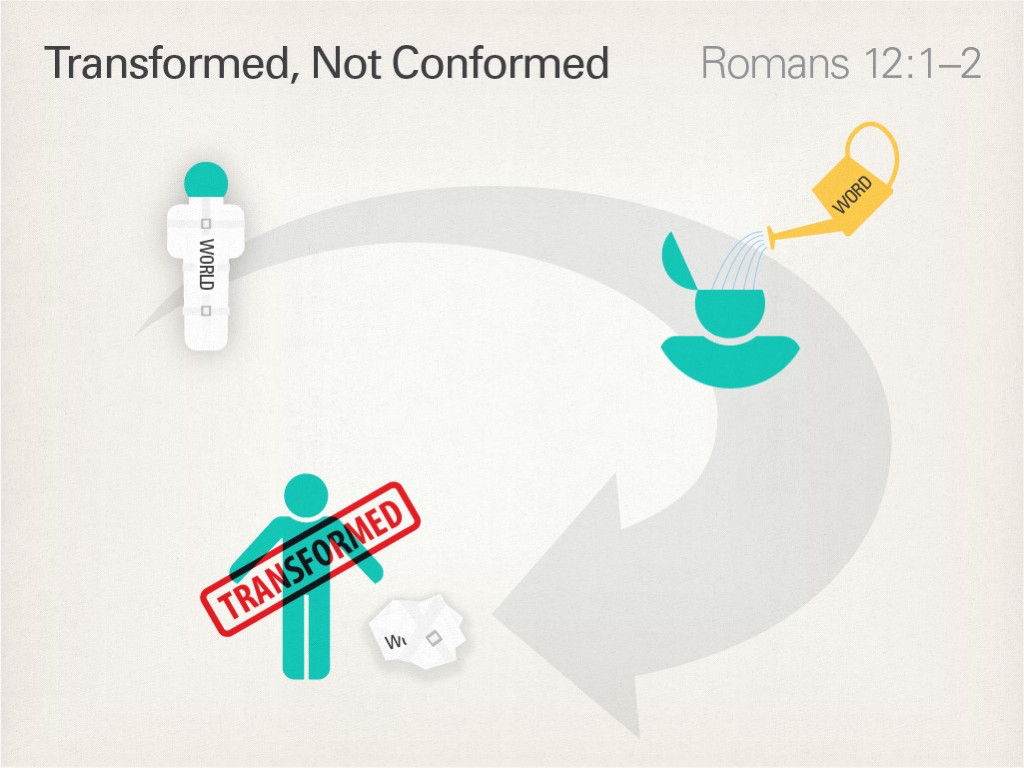Romans 12:1-2 Christian Dedication
This is the fourth “therefore” in the letter. Romans 3:20 is the “therefore” of condemnation, declaring that the whole world is guilty before God. Romans 5:1 is the “therefore” of justification, and Romans 8:1 the “therefore” of assurance. In Romans 12:1, we have the “therefore” of dedication, and it is this dedication that is the basis for the other relationships that Paul discussed in this section.1
This progression of salvation in the book of Romans goes from negative to positive. It starts with condemnation. Every sinner is condemned. Then it moves to justification. Every sinner who comes to Christ is made right with God. We have moved from negative to the starting point of zero. Our lives start anew as we make the commitment to follow Jesus Christ. After this, every Christian moves through a time of assurance. Here, there is “no condemnation for those who are in Christ Jesus.” Romans 8:1 is the opposite position from Romans 3:20. We have moved from negative to positive. At this point, every Christian may have questions. But they work through these questions, always pressing forward.
Paul takes a parenthetic detour in Romans 9-11 to describe the new relationship in Christ and the question of the people of Israel. After this parenthesis, Paul picks up again in the nature of the spiritual journey every Christian has with Jesus Christ. Here, Paul describes the importance of dedication to the Christian life.
“By the mercies of God”
Paul has spent three chapters describing the mercy of God is providing a plan for people who were not Jews to come to Jesus Christ. We are not accepted as God’s people because we are good people. We are accepted because of God’s mercy.
You give your body (Romans 12:1)
“Therefore, brothers, by the mercies of God, I urge you to present your bodies as a living sacrifice, holy and pleasing to God; this is your spiritual worship.” (Romans 12:1, HCSB)
Where do we present our bodies? In the Old Testament, the dead bodies of animals were presented as an offering to God at the temple.
R.C. Sproul has said:
To be a Christian means to live a life of sacrifice, a life of presentation, making a gift of ourselves to God.2
Today, we don’t have to die to make a sacrifice. In order to show dedication to God with our bodies, we can do three things:
THREE RESPONSES OF CHRISTIAN DEDICATION
Living
In other religions, there are certain requirements to attain spiritual enlightenment. Islam, Buddhism, Hinduism, Mormonism, and even Judaism have requirements to attain perfection. Christianity is different. Other religions say: Do this to get to be with God. Christianity says: God has already done what is necessary to be with us. So all we have now is a response, not a requirement. We don’t have to do good works to obtain God’s mercy, forgiveness, and acceptance. We already have that through the work of Jesus Christ. All we need to do now is respond to that.
The first response we can give is to live for Jesus Christ. We live in a body everyday. We move, breathe, sleep, yawn, eat, and act in a body made by God. God wants us to live for Him everyday.
Holy
The second response is to be holy. That means to be different. Not “holier than thou” like we know everything. We just respond out of a recognition that we need God. So we take God seriously. We talk to Him. We ask of Him. We worship Him.
Pleasing
My third response is to be pleasing to God. We respond to God in a pleasing way when we give Him the honor that is due Him – that is called worship. It is an act of Christian dedication. When I recognize what God has done for me, I will want to surrender to Him. I want to please Him. To please Him is experienced in worship. The first and most important response is meaningful worship (vv. 1–2). True worship consists of total self-surrender.3
But sometimes, we get sidetracked. We stop realizing how important Christ’s contribution is to my life. Why do we get sidetracked? It is because of the world. This is why we have to give more than just our body, we also have to give:
You have to give your mind (Romans 12:2)
“Do not be conformed to this age, but be transformed by the renewing of your mind…” (Romans 12:2, HCSB)
The world is in the business of conforming. The world wants everyone to follow along. They want to shape your mind. Like clay in the hands of a potter, the world want to mold you into its way of thinking. Because Satan is the ruler of this world, the thoughts, philosophies, and ideas that come from the world typically don’t submit to God. There are three avenues into the mind. These same three avenues were what Satan showed Eve when he tempted her:
SATAN SPEAKING (EARS)““In fact, God knows that when you eat it your eyes will be opened and you will be like God, knowing good and evil.” Then the woman (EYES) saw that the tree was good for food and delightful to look at, and that it was desirable for obtaining wisdom. (EXPERIENCE) So she took some of its fruit and ate it; she also gave some to her husband, who was with her, and he ate it.” (Genesis 3:5–6, HCSB)
THREE AVENUES THAT THE WORLD USES TO MOLD YOUR MIND
1. Ears
The first avenue that the world uses to mold your mind is the ears. Satan wants you to listen to someone other than God. It doesn’t matter who. He will tempt you to listen to other conversations. What you learn can come through the ears. This is the reason that in the New Testament, Jesus encouraged us to listen. He also said to isten to the Spirit.
“Anyone who has ears should listen!” (Matthew 11:15, HCSB)
““Anyone who has an ear should listen to what the Spirit says to the churches. I will give the victor the right to eat from the tree of life, which is in God’s paradise.” (Revelation 2:7, HCSB)
Words from people, from radio, television, social media. Words that are heard can enter the mind to influence the decision-making process.
2. Eyes
The second avenue the world uses to mold our minds are the eyes. What we see has an impact on what we say and do. We watch a lot. Whether it is on the television, on YouTube, Facebook, or some other form of media, we watch. We also watch people and how they interact. Our eyes communicate to us how to see the world. We judge actions by what we see. Our eyes can be fooled. We can believe things that are not true. Illusion and magic show us that our eyes can be deceived.
Jesus compared the eyes to a lamp. He described that if the eyes is good, then the body will be good.
““The eye is the lamp of the body. If your eye is good, your whole body will be full of light. But if your eye is bad, your whole body will be full of darkness. So if the light within you is darkness—how deep is that darkness!” (Matthew 6:22–23, HCSB)
If we put good things into our eyes (which go to our mind), then it will light us up like a light. If we put bad things into our eyes (which go to our mind), then it will darken us and we will not see and discern what is right from wrong. We can’t do what God wants us to do. Our eyes literally blind us.
3. Experience
The third avenue that the world uses to mold our minds is experience. Just as Eve experienced sin for the first by eating a forbidden fruit, experience is a teacher that gives us lessons. We experience sin just as we experience righteousness. It takes discernment to know if what we are doing is right or wrong. Where does the Godly discernment come from? It comes from being transformed. How are we transformed? We are transformed by Godly experiences that are developed through relationships.
How can I experience Godly experiences? How do I get that transformation?
“…but be transformed by the renewing of your mind…” (Romans 12:2, HCSB)
This word transformation has come into our English language as the word “metamorphosis.” It describes a change from within. The world wants to change your mind, so it exerts pressure from without. But the Holy Spirit changes your mind by releasing power from within. If the world controls your thinking, you are a conformer; if God controls your thinking, you are a transformer.4
“For the word of God is living and effective and sharper than any double-edged sword, penetrating as far as the separation of soul and spirit, joints and marrow. It is able to judge the ideas and thoughts of the heart.” (Hebrews 4:12, HCSB)
“In the same way the Spirit also joins to help in our weakness, because we do not know what to pray for as we should, but the Spirit Himself intercedes for us with unspoken groanings. And He who searches the hearts knows the Spirit’s mind-set, because He intercedes for the saints according to the will of God.” (Romans 8:26–27, HCSB)
We are weak. We don’t know how to pray like we should. We don’t know the mind-set of the Holy Spirit. The Holy Spirit knows God’s will perfectly. But we don’t. We have to go find it out. How do we do that? We read the Word of God (the Bible) and we let the Holy Spirit speak to us God’s wisdom which will line up with the Word of God in a personal way. We have to let God in through our eyes, our ears, and our experiences to get our mind renewed. We need to listen to the Spirit in prayer. We need to listen to God through His Bible everyday.
The mind is renewed every day. I go to sleep and my mind is refreshed when I wake up. Spiritually, the same idea is true. I have to spend time with God every day. Look at how much time we spend with our ears, eyes, and experience listening to the world. We get up, we turn on the radio. We turn on the TV. We look on our smartphones. Think about how much time we spend doing that. Now add the time you get to hear other people talk to you.
Compare that to time you spend with God. Most people say that they spend 5-10 minutes in prayer every day. Although in reality it is more like a minute or two. If they are lucky, they come to experience worship with the church once or twice a month.
Sure, some are reading posts from other people that seem Godly. But how many people are getting into God’s Word? How many people are digesting His Word into their minds? How many are reflecting what God is showing them in the Word? How many people can say that they heard God speak to them clearly today? This week? This month? This year? If you have not heard from God clearly within a year, you sure are not going to submit to His will now.
So we need to get into His Word. If you have not started a time of reading the Bible and listening to God, you need to start.
You give Him your will. (Romans 12:2)
“…so that you may discern what is the good, pleasing, and perfect will of God.” (Romans 12:2, HCSB)
In Romans 12:2, Paul explains that the natural consequence of allowing God and His Spirit to do this transformative work in our lives is a growing ability to discern and approve God’s will.5
You learn to submit to God’s will because it is good, pleasing and perfect. However, you only get these benefits if you are submitting to Him. He will only let you discern or discover His will if you are watching, listening, and obeying Him through experience. This takes willpower. But God can use your willpower for His glory.
1 Warren W. Wiersbe, The Bible Exposition Commentary, vol. 1 (Wheaton, IL: Victor Books, 1996), 554.
2 R. C. Sproul, The Gospel of God: An Exposition of Romans (Great Britain: Christian Focus Publications, 1994), 195.
3 Fred Fisher L., “Romans,” in The Teacher’s Bible Commentary, ed. H. Franklin Paschall and Herschel H. Hobbs (Nashville: Broadman and Holman Publishers, 1972), 717.
4 Warren W. Wiersbe, The Bible Exposition Commentary, vol. 1 (Wheaton, IL: Victor Books, 1996), 554.
5 Steven E. Runge, High Definition Commentary: Romans (Bellingham, WA: Lexham Press, 2014), 214.




















